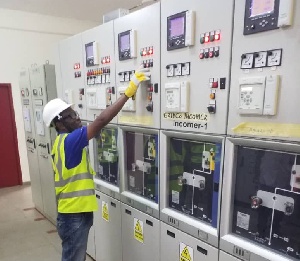- Home - News
- Elections 2024
- News Archive
- Crime & Punishment
- Politics
- Regional
- Editorial
- Health
- Ghanaians Abroad
- Tabloid
- Africa
- Religion
- Photo Archives
- Press Release
General News of Monday, 19 May 2025
Source: www.ghanawebbers.com
Private involvement in ECG urgent or sector may collapse, says Prof. Bokpin
Economist Professor Godfred Alufar Bokpin warns that the Electricity Company of Ghana (ECG) is at risk of collapse. He emphasizes the need for urgent reforms and private sector involvement.
Speaking on Newsfile, Prof. Bokpin described ECG's current operations as unsustainable. He believes they cannot support Ghana’s development goals, including a proposed 24-hour economy.
He expressed concern about the energy sector, stating it keeps him awake at night. He criticized both major political parties for their management of this sector.
Prof. Bokpin noted that both the NDC and NPP face similar challenges in energy management. He believes politicizing the issue will not help resolve these fundamental problems.
He highlighted that ECG's distribution losses are alarmingly high, around 40%. Even a loss rate of 15% would be concerning. Such losses hinder realistic pricing and cannot be passed onto consumers.
Collection losses are another significant issue, nearing 15%. This figure exceeds the global average and is unsustainable.
Prof. Bokpin also raised concerns about unpaid electricity bills from government institutions. He mentioned ministries and agencies must take responsibility for their energy use.
He pointed out that sensitive installations often do not pay for electricity, which is problematic for future planning.
He questioned how a 24-hour economy can be feasible when power supply issues affect the current 8-hour cycle.
Prof. Bokpin advocates for private sector participation in power distribution and collection but not selling ECG outright. The government can remain the sole shareholder while inviting private investment to improve efficiency.
He acknowledged internal issues within ECG, such as poor procurement practices and political interference. These factors contribute to the urgency for reform in power distribution.
The professor linked these reforms to Ghana’s IMF-supported program, which includes structural benchmarks for managing ECG effectively.
He stated there are clear indicators that the government must meet under this program. A cabinet decision regarding private sector participation in ECG is pending, he added.
Prof. Bokpin urged transparent communication from the government about its plans for ECG with Ghanaians.











